Nursing Annual Report 2024 | Sailing Towards Magnet Mastery
Transformational Leadership |

Donor Milk for Term Babies: Now offered on both El Camino Health campuses
It is a well-established fact breastmilk is the ideal nutrition for all newborns. However, there are times when even a healthy, full-term baby may need extra milk before their mother’s milk supply is fully established. Previously, a new mother would express some of her own milk for her baby but if that was not enough, formula was the only option to bridge until the mother’s milk supply increased. However, the American Academy of Pediatrics recommends offering banked donor milk before formula whenever possible.
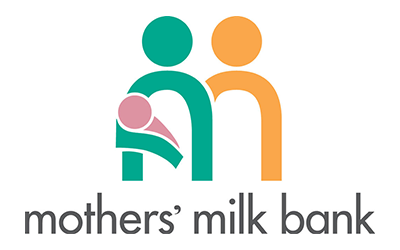
Now, El Camino Health is proud to offer banked donor milk purchased from the Mothers Milk Bank in San Jose as an option to providing formula to term newborns for supplementation. This valuable milk is available to patients at no extra charge thanks to the generosity of El Camino Health. In the past, only premature or sick babies in the NICU received banked donor milk, but the Mothers Milk Bank now receives enough donated milk to be able to provide term babies with the same valuable option.
Why banked donor milk? Studies have shown that protecting a newborn’s gut from cow’s milk protein (i.e. formula) for the first 72 hours reduces that baby’s risk of cow’s milk allergy, intolerance and possibly colic for several years. In addition, banked donor milk provides many factors that enhance a newborn’s immune system. These first days in the hospital truly matter.
To make this vision a reality, we established a donor milk committee in January of 2023, with members of the lactation teams, nursing staff, neonatologists, and managers from both campuses. Together, we first obtained a Tissue Bank license for Los Gatos to allow them to purchase and utilize banked donor milk for both their NICU babies and term babies. (California recognizes breast milk as a tissue, therefore requires a tissue bank license). Mountain View already had a tissue bank license through the NICU, so no additional work was required for Mountain View. Next, the team reviewed the steps it would take to institute donor milk on the maternity units, including purchasing designated refrigerators, freezers, breast milk warmers, and other supplies. Maternity Managers were supportive of this process and ordered necessary items. The team then focused on the logistics of consent vs acknowledgment of education regarding the risks, benefits and alternatives of banked donor milk. Initially, pediatricians were required to obtain consent but shortly thereafter, Risk Management supported moving toward nurses providing “Acknowledgement of Education Regarding Banked Donor Milk” instead, as is the community standard.
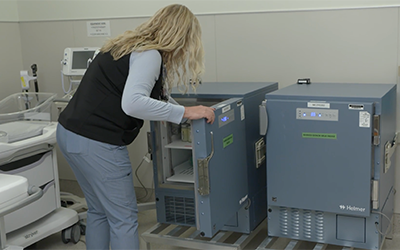
Nurse preparing donor milk for newborn in Maternity unit
A handout describing the FAQs regarding the safety of banked donor milk (the screening of donors, the pasteurization process, and testing procedures, etc.), was designed and provided to all patients as part of their pre-admission packets, discussed in all prenatal classes and tours, and provided to obstetricians (OB’s) to offer to their patients. Our goal was to have patients have an understanding of the safety and value of banked donor milk before they arrived at the hospital.
We next brought the team’s draft of nursing workflow for providing banked donor milk to the Maternity Unit Partnership Council (UPC) for approval and then to the staff meetings, OB, and Peds department meetings. After several revisions, especially related to the many steps of labeling dates, lot numbers, time of expiration and double checks, we were ready to begin training the nursing staff. On July 28, 2023, both campuses launched providing banked donor milk to any family wishing to offer it to their baby instead of formula. The response was positive from the patients once they understood both the value and safety of utilizing banked donor milk vs formula if their baby needed supplementation.
The nurses acknowledge although there is extra work involved in preparing, warming, and offering banked donor milk vs formula, knowing it is providing the highest quality of care for their patients is very satisfying.
Because of the availability of banked donor milk, both campuses have seen large increases in the exclusive breastfeeding rates upon discharge, as well as a decrease in racial and ethnic inequalities related to breastfeeding outcomes, ensuring a better start to our families’ journey.
Also, in 2023, the lactation team joined with the Mothers Milk Bank to offer a community donor milk drive, which brought in 16,292 ounces of milk to be processed and then distributed to hospitals and families in the community. These grateful patients are so happy to give back!
Developing Collaborative Relationships
Endoscopy Department hosts a Physician Skills Lab with Boston Scientific and Fujinon
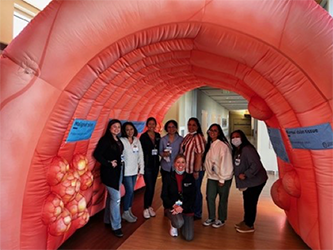
Megacolon installation at Physician's Skills Lab for Endoscopy
Endoscopy hosted a Physician’s Skills Lab in conjunction with Boston Scientific and Fujinon. We brought in Fujinon endoscopy equipment, set up 4 procedure stations with porcine stomachs and our physicians and staff were able to practice using various devices. In addition, six other vendors were set up at stations with devices and demos. It was a huge success, which we plan to repeat each year. Approximately 50 physicians and staff working together attended the event. We even had a Mega Colon set up in the hallway leading to our department.
Late Preterm Infant Care in the Maternity Unit: Improving infant feeding and milk supply management in our most vulnerable well baby population
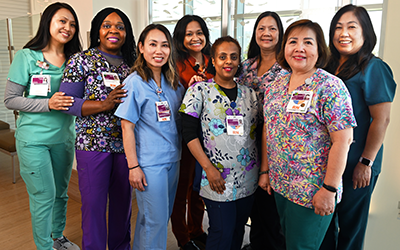
Maternity Unit Practice Council members
Mandated by our Maternity Unit Practice Council, a team of 12 nurses and two lactation consultants undertook to review and make recommendations for evidence-based care of our Late Preterm Infants. After conducting a thorough literature review, our team identified gaps in breastfeeding and lactation management for this population. A need to update nursing workflows, the infant feeding order-set, and patient education materials was also identified. Beginning in February through May 2023, our team conducted a "test of change" with this population that involved five primary goals:
- To start mothers breast pumping at their time of admission to the Maternity unit, or within the first four hours postpartum
- To decrease the time to first visit with a lactation consultant to within 12 hours postpartum
- To gather feedback from nurses about this potential change in practice on nursing workflow and their impressions on impacts for milk supply management and breastfeeding outcomes
- To collect data about the impacts of these interventions on breast milk feeding at time of discharge
- To review and revise all nursing workflow tools and patient education.
We aimed to test this workflow out with at least 12 mother-infant pairs, and in total completed it with 16 mother-infant pairs.
Outcomes:
- Goal 1-Initiate pumping within 4 hours of delivery: 12/16 mothers started pumping within 4 hours of delivery. 12/16 also pumped 4 or more times on the day of delivery, in addition to breastfeeding.
- Goal 2-LC visit within 12 hours of delivery: 7/16 mothers were seen within 12 hours of delivery, but 12/16 mothers were seen within 16 hours of birth.
- All patients were seen by an LC within 16 hours of delivery, each of these mothers had more daily episodes of breastfeeding and improved milk supply at discharge compared with moms seen by the lactation consultant AFTER 16 hours postpartum.
- Goal 3-RN feedback: RN's overwhelmingly positive about intervention. Impressions were moms had more milk in earlier. Suggested that support from unit is helpful, such as Resource RN helping by setting up pumping equipment in Maternity room prior to mother’s transfer from L&D.
- Goal 4-Any breast-milk feeding at time of discharge: 16/16 mothers in test of change were still breastfeeding in the 24 hours prior to discharge. 3/16 (including 2 multiparas and 1 primipara) infants were exclusively fed with their mother’s own milk (via both breast and bottle) at time of discharge. 4/16 infants who also needed formula supplementation the first day were exclusively supplemented with their mother’s own pumped milk in the 24 hours prior to discharge. Overall, 7/16 infants were receiving exclusive mother’s own milk at time of discharge due to sufficient volumes collected through early pumping initiation.
- Goal 5-Revising nursing tools and patient education: Workgroup revised all patient education materials and the LPI Checklist used by RNs to manage. All recommendations were presented to several nursing and pediatric committees, which ultimately assisted in revision of the LPI infant feeding order set.
- Other outcomes: None of the infants in the test of change were readmitted to the NICU within 30 days of discharge.
Cardiac Pulmonary Wellness Center: Team advocates for Health Promotion
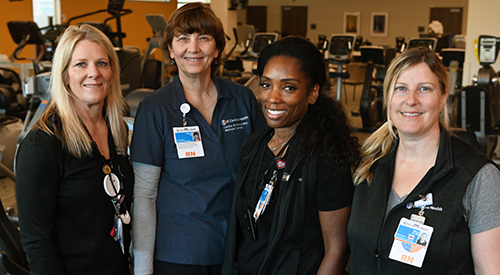
Cardiac Rehab team members
2023 was a busy year in Washington, DC with legislature pending approval that would greatly affect our delivery of quality care for both Cardiac and Pulmonary Rehab. These programs are essential and beneficial for those that qualify to participate. Both programs are nationally certified through the American Association of Cardiovascular and Pulmonary Rehabilitation (AACVPR), and this organization is our leading advocate for improving practice around the country. There were two bills pending in Congress that would affect accessibility and feasibility. Our nurses attended Day on the Hill to meet with constituents to tell "our story" and why these bills should be passed. We shared personal patient stories as examples of positive outcomes. We also wrote letters to our local congressman and congresswomen: Anna Eshoo, Zoe Lofgren, and Jimmy Panetta in support of these bills (HR 955/S.1849 and HR 1406/S.3021). Through much effort, commitment and passion for our profession and the patients we serve, we continue to advocate locally and nationally to make sure our voices are heard.
